Ian Chapman was president of Northern Baptist Theological Seminary in Lombard, Illinois, for 13 years before retiring in 2001, when he was named to a three-year term as chancellor. In 1992 he and a few American colleagues visited St. Petersburg, Moscow, and other cities in Russia, where local Baptist leaders asked for help in establishing a theological seminary. Chapman considers this his "Macedonian call."
Chapman and his colleagues initially raised $25,000 from North Americans, and in the early 1990s, before rampant inflation increased costs in Russia, that was enough to start the Moscow Theological Seminary. Since then, Russian Leadership Ministries, the United States -- based fundraising arm of the school, has raised several million more to acquire a building. The group has also begun to support another school, the Moscow Theological Institute, which operates in four extension sites --
essential in a country that spans 11 time zones. The two schools are owned by the Russian Baptist Union, and together they serve about 250 students.
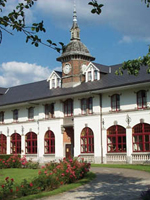 |
| Continental Theological Seminary, Sint-Pieters-Leeuw, Belgium (CONTINENTAL THEOLOGICAL SEMINARY) |
Robert E. Cooley is president emeritus of Gordon-Conwell Theological Seminary in South Hamilton, Mass. His leadership in overseas theological education is vast and varied: For the past 10 years, Cooley has served on the board of Continental Theological Seminary, a Pentecostal school in Sint-Pieters-Leeuw, Belgium.
For five years, Cooley has chaired the board of Evangel Theological Seminary, a Pentecostal school in Kiev, Urkaine. He serves on the board of New Europe Vision, a North American fundraising organization that supports Evangelical Theological Seminary in Osijek, Croatia. He has helped foster partnerships and exchanges between Gordon-Conwell and Pyongtaek University in South Korea (which includes the Pierson School of Theology, founded by American missionary A. T. Pierson, who was also an early president of one of Gordon-Conwell's predecessor schools). He has served as a counselor to 19 theological seminaries and institutes in Asia.
In December, In Trust editor Jay Blossom asked Chapman and Cooley to share some of the challenges faced by North Americans who support overseas theological schools.
How can involvement in international theological education strengthen a North American school?
Ian Chapman, former president, Northern Baptist Theological Seminary: I was surprised at the response of the board and our donors. Many of our donors thought it was absolutely amazing that we were helping start a seminary in Russia while we were also trying to take care of our own needs. In an amazing way, this served to legitimate what we were doing in the United States. People would say to us, "We're so surprised and grateful that you're not just raising money for yourselves." In a sense, this became an affirmation that we were really a global people with a Kingdom vision.
We also had some students come over to America for education, and that helped to diversify our school and give our people a larger vision.
Robert Cooley, former president, Gordon-Conwell Theological Seminary: I think partnership programs enrich in both directions. Not only does the North American school get enriched from a global dimension, by learning about the development of the church throughout the world, but nationals become enriched with leadership education.
What advice do you have for a North American board member or theological school with a vision for overseas theological education?
Chapman: My first counsel would be to proceed very, very cautiously. I would not go anywhere where the national leadership did not invite me. There are too many situations where missionaries from the West have gone to a country and then informed the local people what they're going to do.
You need to be prepared for a complex set of relationships related to finance and governance. Western people are used to audits and above-board dealings with money, and that is not always the way it is in other parts of the world. Shared governance is very Western, a very American concept. In Russia, the default leadership style is the czarist style. For example, Baptists are democratic, but in the Russian Baptist Union, the president can appoint pastors, and does. It's the history of the country. So I think you really need to have your eyes open and you ought to be careful.
My school [Northern Seminary] was amazingly supportive, but you have to be scrupulously honest with yourself: if you're raising money for your own school and the overseas school, how do you deal with your donors? What's happening overseas may be much more exciting than your own school. In some situations -- not in Russia -- donors can see that investment goes further overseas than it does at home.
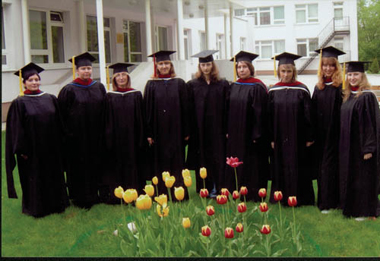
In 2005, Moscow Theological Seminary graduated its first female students.
(COURTESY IAN CHAPMAN)
Cooley: The motivation for engagement must be formalized. In other words, a school should be invited into a country -- or into a setting or an association -- before becoming involved. An American school should not simply say, "We need this in our vision, and therefore let's cast about and find a place."
This invitation can come in three ways:
-
Local individuals with connections who open doors and invite a North American institution.
-
An association, denomination, or partnership of dominations that invites a school to help them in leadership development.
-
A North American denomination with an international department or missions department that has established institutions and schools in the overseas country, and they invite their North American colleagues to participate with them in an already established international program.
Anything done overseas should be indigenous and relate to the nationals. We dare not transport North American accreditation systems or institutional governance designs or cultural traits. Otherwise,we're going to immediately run into a clash of styles, of culture, and of values. So, consequently, we need to learn the receiving context in which we're going to work.
We dare not export North American governance systems and accreditation standards to other countries?
Cooley: I think at the core of that issue is a national cultural understanding of the role of authority. In other countries, making decisions or appointments can be so completely different than in a more democratic environment. So a concept like shared governance -- where you're going to share authority between structures -- is a strange phenomenon in many of these cultural settings. To import shared governance into such a setting is confusing to a board that is used to a more authoritarian approach to decision-making.
One of the issues I had to deal with in Ukraine was to introduce them to a more parliamentary form of meeting management and decision-making -- they had been accustomed to a more consensual approach. They were quite willing to take all the time in the world when some decisions could be made with much more efficiency and promptness.
What are the potential pitfalls for North American boards whose schools are connected with overseas theological education?
Cooley: I think there are several:
Because of their history and culture, educators in other countries take a different approach to the process of education itself. Sometimes a different language has to emerge if we are to move ahead as partners with them. I've already mentioned the difference in decision-making patterns or governance patterns. We need to learn a variety of governance systems in order to relate to them.
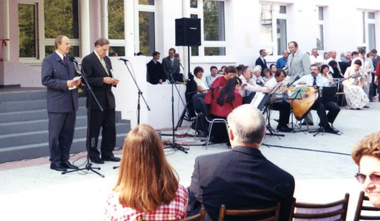
Dedication of Moscow Seminary building.
A North American understanding of philanthropy is not really a part of many cultures. The idea of a donor-based economy is foreign to them. Yet they do not have the money for higher tuitions. They can pay a symbolic tuition, but the real money has to come from someplace else. It's sometimes difficult to find nationals who are qualified to teach. Yet there's a danger in imposing Western professors with Western values.
I think these are the areas that really need study by a board if the school is going to become engaged with another school overseas.
Chapman: In this country we do recruitment by going to affinity groups like Christian colleges. They don't have those in Russia. How do you recruit in a country where you have churches, but most of the churches are small, and the pastors have limited education?
Also, when you graduate from seminary, you're not guaranteed you'll have a paying job, and so you're forced to be bi-vocational. How do you recruit students to spend two, three, four years in education without any promise of employment to support their families? It makes it difficult for the schools to find students willing to do that.
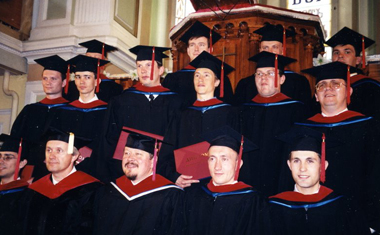
Moscow Theological Seminary graduates in 2002.
(COURTESY IAN CHAPMAN)
The Russian people are very literate, and they want education. I think part of the curricular design has to involve some kind of training -- or at least one degree program -- which will enable them to seek employment outside the church.
Are you optimistic about the governance structures of overseas boards?
Cooley: I would say I'm optimistic, but not enthusiastically optimistic. I think we've experienced some successes. Working with the board in Western Europe has been a delightful experience, because over a 10-year period, we have Europeanized the board, the institution, and the program.
In the Ukraine, I'm optimistic because after five years, the board accepted a self-defined organization that works for them. And they have elected their chairman from Moldova, and they have now nationalized most of the governance approaches in the institution. Now, obviously they haven't functioned with the efficiency we would desire in North America, but they are moving ahead and they are staying with the structure. I'm not enthusiastically optimistic simply because it's going to take time. It's going to be a process, not an event.
In Korea it's a different -- I'm very optimistic there, because Christianity is 40 percent of South Korean culture and society. The dominance of the Christian church there over the years has prepared the Koreans for a much more Western approach to institutions. So, there the optimism is enthusiastic, and you see the results of it in their growth, in their progress, and in the development of the institution.
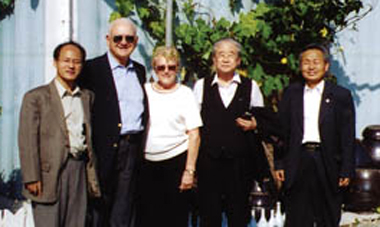
In Seoul, South Korea, Robert & Eileen Cooley join Ki Hung Cho, president of
Pyongtaek University and Pierson Theological Seminary, and other senior
administrators of the school. Dr. Cho is second from right.
(COURTESY ROBERT E. COOLEY)
Is it hard to raise money for overseas education? I suppose there can be an outright conflict between raising money for a school here and raising money for a school there. On the other hand, you said that it also makes your donors happy to know that you're doing something beyond your own walls.
What's the financial picture for North Americans who are involved in this?
Chapman: With our organization, Russian Leadership Ministries, we are providing 90-some percent of the support of the school. We now have a plan in place for the leadership of the whole Russian Baptist Union to move toward providing 10 percent of the school's support each year. This is part of accepting responsibility for their own school.
We started the school with the cooperation of the Russian Baptist Union. But in 1993 our costs were $27,000 per year, and now they're close to $250,000. So the costs get to be significant, and that's why you have to be open about how much you're going to be able to raise, and the implications for your own school.
I haven't been part of Northern now for almost six and a half years. But I do think that as long as I was there, the board and the donors really felt that this was a mission of God, and we needed to be a part of it.
Cooley: From the North American school side, it's really an investment in Kingdom work. Just as any local church benefits from its mission and outreach programs, a school can benefit from its mission outreaches. But there does need to be a larger financial sponsoring agency involved in a relationship, because if 90 percent of the budget of the overseas school is being subsidized, that's a tremendous annualized burden that needs to be well planned. One should not enter into this with only a visionary approach. There has to be a sustainability approach as well.
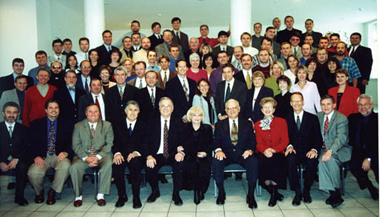
In Kiev, Ukraine, the students and board of trustees of Evangel Theological Seminary.
(COURTESY ROBERT E. COOLEY)
In Kiev we started a process for each of the national Pentecostal unions to begin to own the institution and to invest in it. We started them at the lowest numbers you can imagine in order to get them into the experience of supporting an institution. And their response has grown year in and year out. They now provide about 10 percent of the school's budget.